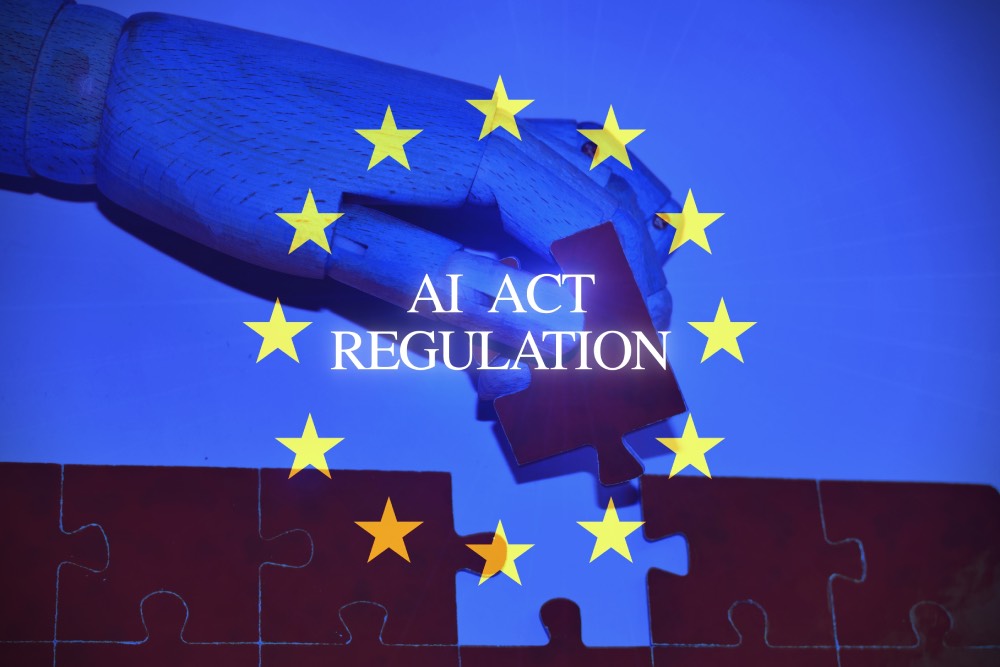Europe just passed the world’s most sweeping AI regulation—and American businesses are on notice.
The EU AI Act doesn’t just affect European startups or tech giants. It targets any company using AI to serve EU customers, including those in the U.S.
As enforcement ramps up, U.S. firms may be forced to raise their privacy game—whether Washington acts or not.
INSIDE THE LAW: HERE’S WHAT JUST HAPPENED
The European Union officially adopted its long-awaited AI Act in late 2023, marking the first binding legal framework for artificial intelligence globally. The law takes full effect by August 2026, but some provisions are already in place.
The Act applies not just to European companies, but to any organization—worldwide—that provides AI-powered products or services to EU consumers. That includes American tech companies, enterprise software vendors, and even small startups targeting overseas users.
At its core, the EU AI Act classifies AI systems by risk level: minimal, limited, high, or unacceptable.
-
Low-risk systems like spam filters and video games face little oversight.
-
Limited-risk tools—like chatbots, virtual try-ons, or content filters—must disclose their AI nature to users.
-
High-risk AI includes systems used in credit scoring, hiring, border control, and public infrastructure. These must meet strict rules on documentation, testing, and human oversight.
-
Unacceptable risk systems are banned entirely. This includes social scoring, real-time biometric surveillance for policing, and manipulative tools that undermine free decision-making.
Since February 2025, these banned AI uses have been illegal within the EU. And for “general purpose AI” (like GPT models), compliance hinges on transparency: developers must reveal training data summaries, offer usage documentation, and meet copyright obligations.
Although some tech leaders have pushed back, the European Commission plans to revisit and possibly revise the Act in future review cycles. For now, the message is clear: compliance isn’t optional.
WHAT’S AT STAKE FOR U.S. BUSINESSES
If you run a U.S. business that uses AI for recruiting, product recommendations, or analytics—and serve European users—your playbook may need an overhaul.
Under the Act, violations like deploying banned systems or failing to provide required transparency can lead to fines of up to 7% of global revenue. That’s higher than GDPR penalties. And the enforcement window begins closing by 2026.
Yelena Ambartsumian, founder of NYC-based AMBART LAW, warned that American companies “must ensure their AI systems meet the transparency and documentation standards set by the EU.”
“Failure to comply,” she added, “could result in penalties, market restrictions, and reputational damage.”
Pete Foley, CEO of ModelOp, echoed that sentiment: “U.S. companies could stand to receive a wake-up call,” urging firms to reevaluate AI governance before the heat turns up.
The shift could hit small and midsize firms hardest. Without compliance infrastructure or regulatory teams, startups may struggle to interpret and apply the new rules. But experts say the costs of delay could be even higher.
EXPERT INSIGHT
“The EU AI Act is GDPR for algorithms,” said Peter Swain, an AI consultant and author. “If you trade with Europe, its rules ride along.”
Swain expects a familiar curve: “early panic, a compliance gold rush, then routine audits. Expect the same pattern here.”
Adnan Masood, Chief AI Architect at UST, added that the Act is already changing user expectations. “Europe is setting baseline expectations for ethical AI,” he said. “Once Americans taste that transparency, they’ll demand it everywhere.”
GAZEON’S TAKE: WHERE IT COULD GO FROM HERE
Whether or not the U.S. passes a federal AI law soon, the bar has been set. European rules are already influencing product development and data governance far beyond the continent.
American consumers may not feel it today—but the ripple effects are coming. Tools built for Europe will likely become global defaults.
This may pressure U.S. companies to unify around EU-style ethics and privacy—by design, not by force.
QUESTION FOR READERS
If the U.S. won’t regulate AI soon, should Europe’s rules become the global standard by default? What’s your take?
About Author:
Eli Grid is a technology journalist covering the intersection of artificial intelligence, policy, and innovation. With a background in computational linguistics and over a decade of experience reporting on AI research and global tech strategy, Eli is known for his investigative features and clear, data-informed analysis. His reporting bridges the gap between technical breakthroughs and their real-world implications bringing readers timely, insightful stories from the front lines of the AI revolution. Eli’s work has been featured in leading tech outlets and cited by academic and policy institutions worldwide.




























Pingback: Healthcare’s AI Gap: CHAI Pushes Standards as Regulation Lags
Pingback: Researchers Build Powerful AI Model Using Only Open Data
Pingback: AI Meets Expertise: How Payment Leaders Use Models to Outsmart Risk
Pingback: Proposed Federal AI Law Could Freeze State Rules, Impacting Healthcare AI
Pingback: Senate AI Ban Could Risk $500M in U.S. Broadband Funding
Pingback: Federated AI Boosts Blood Disorder Diagnosis in EU
Pingback: AI Pressure from the Top: CEOs Urge Workers to Adapt